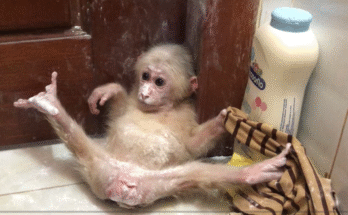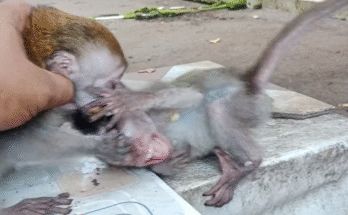Certainly! Here’s a 500-word expanded article based on the title “The Challenges of Raising a Baby Monkey in Captivity” along with a new suggested title:
Original Title: The Challenges of Raising a Baby Monkey in Captivity 😓
New Title: Overcoming Obstacles: The Difficulties of Caring for a Baby Monkey in Captivity
Expanded Version (500 words):
Raising a baby monkey in captivity presents a unique set of challenges that require patience, dedication, and a deep understanding of primate needs. While many facilities aim to provide a safe and nurturing environment for orphaned or rescued monkeys, the process of caring for young primates outside their natural habitat is complex and demanding.
One of the primary challenges is ensuring the baby monkey’s physical health. In captivity, young monkeys are often vulnerable to illnesses due to stress, improper diet, or inadequate living conditions. They require a carefully balanced diet that mimics their natural nutrition, including fruits, vegetables, and specialized formula if they are very young. Providing clean and safe living spaces that prevent injuries, infections, and stress-related issues is critical, but it can be difficult, especially when resources are limited.
Another significant challenge is meeting the emotional and social needs of the baby monkey. Monkeys are highly social animals that thrive on interactions with their peers and their environment. Isolating a young monkey can lead to loneliness, depression, and behavioral problems such as aggression or self-harm. Caretakers must often provide companionship, either through the presence of other young monkeys or through human interaction that simulates social bonding. Achieving this balance without causing dependence on humans can be tricky.
Behavioral development is also a major concern. In the wild, baby monkeys learn essential survival skills from their mothers and social groups—such as grooming, foraging, and communication. In captivity, these skills may be neglected or underdeveloped, leading to future difficulties. Caregivers need to implement enrichment activities that encourage natural behaviors, which requires creativity and a thorough understanding of primate psychology.
Additionally, the emotional toll on caregivers can be substantial. Many people involved in rescuing and raising orphaned monkeys develop strong bonds with their charges. When the time comes for the young monkeys to be released back into the wild or transferred to a different facility, it can be emotionally taxing for everyone involved. Ensuring the monkey adapts to new environments and retains its social skills adds another layer of complexity.
Finally, ethical considerations are at the forefront of captive primate care. It’s essential to prioritize the well-being of the animals, avoid unnecessary captivity, and promote conservation efforts. Raising a baby monkey in captivity should always be done with the goal of eventual release or lifelong care that prioritizes their physical and mental health.
In conclusion, raising a baby monkey in captivity involves numerous challenges—from health care and behavioral development to emotional well-being and ethical considerations. It requires a dedicated team of caretakers, proper resources, and a compassionate understanding of primate needs. While it can be rewarding to see a young monkey thrive and grow, it also demands a serious commitment to ensuring that their captivity is as close to natural as possible, ultimately contributing to the well-being and conservation of these intelligent creatures.
Would you like me to create a shorter summary or a different style?


